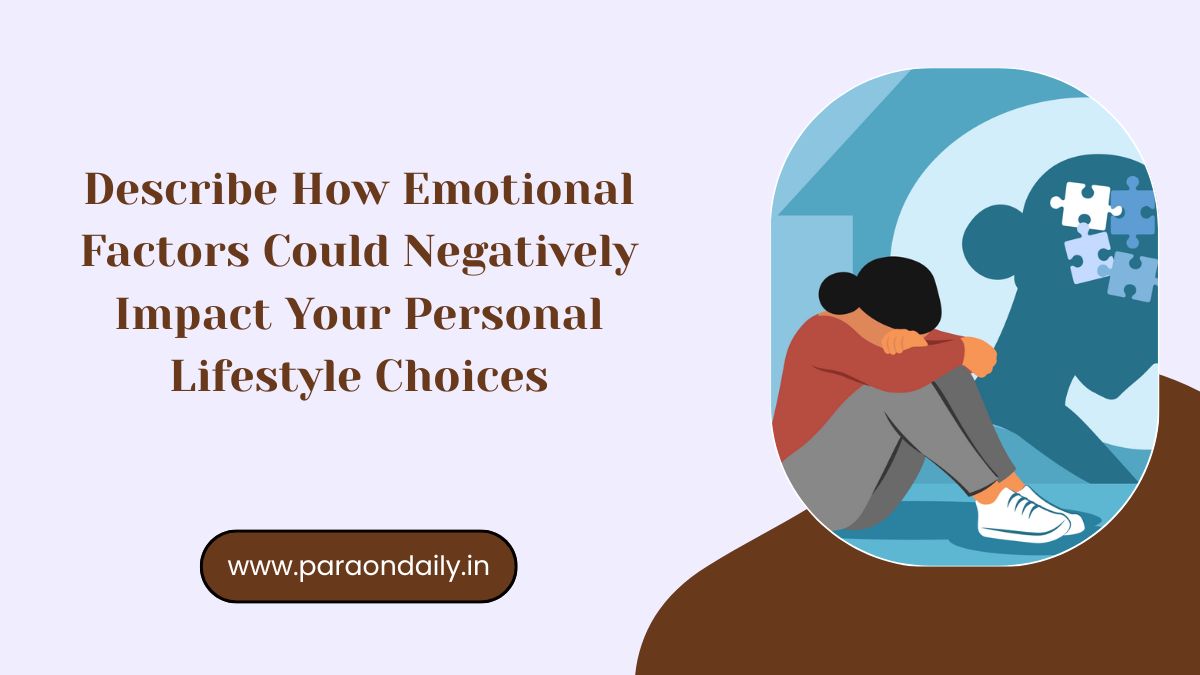Our emotions play a very important role in shaping the way we live our lives. The decisions we make daily, from what we eat to how we spend our time, are often guided by our emotional state. When emotions are positive, they can motivate us to take care of our health and build good habits. However, negative emotions can have the opposite effect, leading us toward poor lifestyle choices.
Many people wonder: “Describe How Emotional Factors Could Negatively Impact Your Personal Lifestyle Choices.” This is an important question because emotions are deeply connected to our behavior, and they can influence our health, relationships, and overall well-being in many ways.
Understanding Emotional Factors
Before exploring their impact, it is important to understand what emotional factors are. Emotional factors include feelings such as stress, sadness, anger, loneliness, frustration, and even fear. These emotions arise naturally in daily life, but when they become overwhelming, they can push people toward harmful decisions. For example, stress may cause someone to eat unhealthy foods, while sadness might make another person avoid exercise.
In short, emotional factors are invisible forces that influence the choices we make. Recognizing them is the first step in managing their effects.
Also read: Name Three Examples of Careers and Explain Their Workplace Environment
Emotional Eating and Poor Nutrition Choices
One of the most common ways emotions affect lifestyle is through eating habits. Many people turn to food when they are stressed, bored, or sad. This is often called emotional eating. Instead of eating for hunger, individuals eat to comfort themselves.
- Stress can push people toward high-sugar or high-fat foods.
- Loneliness may lead to overeating or constant snacking.
- Anxiety might cause loss of appetite, leading to skipped meals.
These habits negatively impact health, causing weight gain, digestive problems, and low energy levels. Emotional eating can also lead to guilt, which worsens emotional health, creating a harmful cycle.
Impact on Physical Activity
Emotional factors also affect motivation to stay active. Exercise requires energy, focus, and consistency, but emotions like sadness or stress can make people avoid it. For example:
- Stress can drain energy and discourage exercise.
- Depression often reduces motivation to leave the house or stay active.
- Frustration can lead to giving up on fitness goals.
Over time, lack of physical activity contributes to obesity, heart problems, and weak mental health. Thus, negative emotions directly reduce the chances of maintaining a healthy lifestyle.
Influence on Sleep Patterns
Sleep is another major area affected by emotions. Stress, anxiety, or sadness can disrupt normal sleep schedules. Some people struggle to fall asleep because of racing thoughts, while others oversleep as a way of avoiding emotional pain. Both situations harm the body.
- Poor sleep weakens concentration and memory.
- Lack of rest lowers immunity, making a person prone to illness.
- Disturbed sleep patterns increase irritability and worsen emotions.
When emotional factors affect sleep, they create a cycle where poor sleep worsens emotional health, and emotional stress reduces sleep quality.
Substance Use and Addiction
Negative emotions often lead individuals toward harmful coping mechanisms like alcohol, smoking, or drugs. For example:
- Stress may encourage smoking as a temporary relief.
- Loneliness might drive people toward alcohol consumption.
- Depression can push some toward drug use as an escape.
While these habits might provide short-term comfort, they are destructive in the long run. They harm physical health, damage relationships, and reduce productivity. Addiction becomes an even greater challenge to overcome once emotions remain unmanaged.
Effects on Relationships
Lifestyle is not only about food, exercise, or sleep but also about the quality of relationships. Emotional struggles like anger, frustration, or insecurity can negatively affect communication with family and friends.
- Anger may lead to arguments and damaged trust.
- Sadness can cause isolation, reducing social support.
- Anxiety might create fear of social situations, limiting interactions.
Poor emotional control weakens relationships, leaving individuals without a support system. This loneliness further harms lifestyle choices, as people without social support are more likely to adopt unhealthy habits.
Impact on Work and Productivity
Emotional factors also affect professional life, which is closely connected to lifestyle. For example:
- Stress at work can reduce focus and increase mistakes.
- Anxiety can limit career growth and confidence.
- Burnout leads to unhealthy routines, like skipping meals or sitting for long hours.
When work-life balance is disturbed, it reduces time for exercise, hobbies, and relaxation. This imbalance directly impacts lifestyle quality.
Financial Decisions and Lifestyle
Emotions also play a role in financial decisions, which influence lifestyle. For instance:
- Stress may lead to impulsive spending as a form of relief.
- Depression can result in neglecting bills or important responsibilities.
- Fear may prevent investment in positive lifestyle activities like fitness programs.
Financial instability adds more emotional stress, creating another cycle of poor choices.
How to Manage Emotional Factors
While emotional factors can negatively impact lifestyle, there are ways to manage them:
- Awareness – Recognize when emotions are influencing decisions.
- Healthy Coping Mechanisms – Replace emotional eating with exercise, meditation, or journaling.
- Social Support – Share feelings with trusted friends, family, or professionals.
- Routine – Build a daily routine for eating, exercising, and sleeping.
- Professional Help – Seek counseling or therapy if emotions feel overwhelming.
By actively managing emotions, individuals can make healthier lifestyle choices and build resilience.
Why This Understanding Matters
It is important to learn how emotional factors affect lifestyle choices because awareness brings change. Students, professionals, and families can all benefit from identifying emotional triggers. With better awareness, people can take preventive steps before emotions cause long-term harm.
When individuals understand that emotions like stress or sadness are temporary, they can choose healthier ways to cope. This not only improves physical health but also strengthens relationships, career growth, and overall life satisfaction.
Also read: How Long Is a Mortgage Pre Approval Good For?
Conclusion
When we try to “Describe How Emotional Factors Could Negatively Impact Your Personal Lifestyle Choices,” it becomes clear that emotions have great power over our daily decisions. Stress, sadness, loneliness, or anger can lead to unhealthy eating, lack of exercise, poor sleep, or even substance use. They can also affect relationships, careers, and financial decisions, making lifestyle management difficult.
However, by being aware of these factors and learning healthy coping methods, individuals can protect themselves from falling into negative cycles. Building a strong support system, maintaining routines, and seeking help when necessary are the keys to balancing emotions with healthy lifestyle choices.

